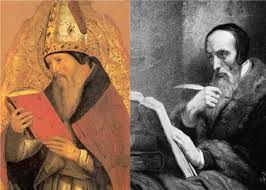Augustine, Calvin, and Predestination

Slamming St. Augustine often seems to be a kind of leisure sport among some Orthodox, despite its lack of historical pedigree. We hear much about Augustine’s negative views on sexuality, his horrible views on sin and damnation, his tragic acceptance of the Filioque, and his erroneous views on predestination. He is sometimes made the whipping boy for everything that went wrong in the west (from an Orthodox perspective) so that one might almost imagine that Augustine had never been born the western half of the Christian oikoumene would never had any problems. The problem with such a negative view of Augustine is that it gives the impression that his teaching on these topics were all that the bishop of Hippo ever wrote, when he fact he wrote reams of stuff which were quite unproblematic and wonderful. That is perhaps why the east, though less familiar with his works than the west, applauded him and valued him.
Take as an example of eastern applause the letter that the Emperor Justinian read to the Council Fathers assembled in Constantinople in 553. In this letter he wrote that “We hold fast to the decrees of the four Councils and in every way follow the holy Fathers, Athanasius, Hilary, Basil, Gregory the Theologian, Gregory of Nyssa, Ambrose, John [Chrysostom] of Constantinople, Cyril, Augustine, Proclus, Leo, and their writings on the true faith”. We note Augustine’s inclusion among “the holy Fathers”. And the Emperor was not speaking idiosyncratically. The Council Fathers themselves evidently shared his view of Augustine. In their final Sentence, they said that in their Synod “Several letters of Augustine, of most religious memory, who shone forth resplendent among the African bishops, were read”. These letters had nothing to do with Augustine’s doctrines regarding original sin, saving grace, or predestination, but rather his notion that heretics could be anathematized after death. This reference does show, however, that Augustine was certainly regarded as a holy Father and even as “of most religious memory, resplendent among the African bishops”. The Council Fathers clearly would have had no time for a dismissal of Augustine as a deformed heretic.
No one bats a thousand, including St. Augustine. That is why the Orthodox follow no single Father, but rather the consensus patrum, the broad general agreement among them about the basics. There was much diversity among the Fathers, but an impressive consensus about certain things as well, and it is to this consensus which Orthodox make their appeal and regard as authoritative. We listen for the essential melody of the patristic chorus, and charitably pass over the odd discordant note which all of the Fathers occasionally sound. Like it or not, Augustine retains his place in the chorus, standing as he does with the distinctively African section.
John Calvin, some thousand years after Augustine, also comes in for some heavy denunciation. He is often paired with Augustine as if they formed a set of dogmatic bookends, so that when one begins denouncing Augustine sooner or later he will get around to denouncing Calvin as well. There is a certain kind of irony in this, because although Calvin had a profound admiration of Augustine it is less certain that Augustine would have returned the compliment. His horror of schism on the part of the Donatists does not bode well for his appreciating the divisions affected by the Protestants.
Since I regard the Protestant Reformation as a glorious and well-intentioned series of mistakes, I will not spend a lot of time lionizing the reformer of Geneva. But even here it is worth saying that there was more to Calvin than his doctrines of sin and predestination. Many people equate “Calvinism” with the doctrine of double predestination, when there was much more to the man than these teachings. He wrote many things, including Bible commentaries which still have value today. It is unfortunate that Calvin has been so thoroughly identified with the doctrine of predestination, as well as with a kind of heartless delight in the damnation of sinners which is quite unfair to the man, and reveals a profound historical ignorance. Indeed, one person objecting to my denial of Universalism once suggested that I must somehow want people to be damned, and he expressed it by saying, “Your Calvinism is showing!” It was as if Calvinism=delight in damnation.
In fact the doctrine of predestination, though an important part of Calvin’s system, is not central to it. As one Calvin scholar wrote, “this [teaching on predestination] must not be taken to be the very centre of his teaching. His earliest writings do not contain any systematic statement of the problem, and although later on he accorded a growing importance to it he did so under the sway of ecclesiological and pastoral preoccupations rather than in order to make it a main foundation of his theology…he only very rarely speaks of predestination except in the four chapters that are devoted to it in the edition [of the Institutes] in 1559.”
For this reason I should like to approach the teaching of the Scriptures on predestination leaving St. Augustine and John Calvin to one side, and thus sitting lightly on historical denunciation of individuals. It is too easy to allow our ad hominem arguments assume an historical dimension, and to assume that fixing the dreaded label “Augustinian” or “Calvinistic” on a disputant somehow settles the argument and disqualifies the person to whom the label is affixed. Labels are rarely helpful, even on the rare occasions when they are used with historical accuracy. Better to leave them out of the discussion and examine the issue on its own merits. For a Christian, this means first examining the Scriptures.
Next: The Scripture’s teaching on predestination
No comments:
Post a Comment